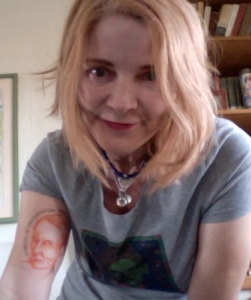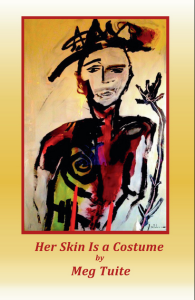Meg has been writing for a number of years and is always at the forefront of what other writers are experimenting with. I just finished reading her new book, Her Skin Is a Costume, a collection of linked flash published by Red Bird Chapbooks and a perfect example of her brilliance and creativity. The compilation reads like a novel as we follow the same family through middle sister, Patsy’s, perspective, though she hones in so closely to different family members’ perspectives it sometimes seems like we’re in their points of view. The stories sing with beautiful language and omit everything that we don’t absolutely need to know, which some novelists could learn from.
Meg Tuite’s writing has appeared in numerous  literary journals. She is the author of two short story collections, Bound By Blue (2013) with Sententia Books and Domestic Apparition (2011) with San Francisco Bay Press, and three chapbooks, the latest titled, Her Skin is a Costume (2013). She won the Twin Antlers Collaborative Poetry award from Artistically Declined Press for her poetry collection, Bare Bulbs Swinging (2014) written with Heather Fowler and Michelle Reale. She teaches at the Santa Fe Community College, is an editor for Santa Fe Literary Review and Connotation Press and has a column called Exquisite Duet up at JMWW. She lives in Santa Fe with her husband and menagerie of pets. Her blog: http://megtuite.com
literary journals. She is the author of two short story collections, Bound By Blue (2013) with Sententia Books and Domestic Apparition (2011) with San Francisco Bay Press, and three chapbooks, the latest titled, Her Skin is a Costume (2013). She won the Twin Antlers Collaborative Poetry award from Artistically Declined Press for her poetry collection, Bare Bulbs Swinging (2014) written with Heather Fowler and Michelle Reale. She teaches at the Santa Fe Community College, is an editor for Santa Fe Literary Review and Connotation Press and has a column called Exquisite Duet up at JMWW. She lives in Santa Fe with her husband and menagerie of pets. Her blog: http://megtuite.com
Bonnie ZoBell: Love your title, Meg, as well as the painting on the cover, which merge so well together. As the title Her Skin is a Costume, the female image seems to have everything stripped away with only her essence left. This is poetic and makes all kinds of implications about who we are and who your characters are. I’d love to hear you talk about this and where the painting came from.
Meg Tuite: My sister, Josie, did this painting that we have up on our living room wall! It’s exquisite and I LOVE her work! Her figures always expose the interior, which is what I try to do in my writing. That is the most interesting aspect of humans. Not so much what we say, but what we think and feel, the underlying layers of vulnerability and fear.
BZ: The first story “May I Please Be Excused from Reality” is outstanding. In the opening line, Patsy tells us, “I roll myself into a tight ball and camouflage myself into a knick knack. Rooms become dense with restraint when Dad comes home.” I’m expecting the big family to be utterly polite and staid at the dinner table at 6:00 p.m. sharp because it’s so strongly implied the father could go into a rage with little provocation. They end up not being polite at all, though they seemed a bit trained when their father asks whether they did was productive that day. They answer clockwise from oldest to youngest, saying such things as, “Yes, sir. I beat the crap out of some pansy after he raised his hand and outdid me in a spelling bee!” How would you articulate the family psychology being shown here?
MT: Once again, what the kids really want to say, not what they say aloud. Kids know how to survive when under extreme restraint and possible abuse. This family knows they must keep it under wraps or get the shit beat out of them and so yes, take it out of the house and into the classroom or on to the playground. The old domino effect of beat me and I’ll beat the smaller kid, the dog, the puddle, the ant colony. They either did these acts of violence or imagined them in order to sustain some sort of ego.
BZ: As mentioned above, this could easily have been a novel if more scenes and perhaps more digressions and explanations were worked in. It’s a fairly long chapbook at 75 pages, though it’s not about pages but about the whole world it invents. Did you take parts out that seemed unnecessary, or are you just that spare even when drafting? To me, leaving so much out was one of the most experimental aspects of the book. You don’t suffer fools, and you do expect readers to figure out what’s missing. Many readers hate being hit over the head with too much info while others like things more spelled out. The balance works really well for me—I think everything is there that needs to be. What has reader reaction been?
MT: I believe we, as writers, find a form that keeps us writing. I have a long novel that I’ve been working on and am now tearing down into the essentials that I can live with. If something doesn’t interest me I have to dump it. So, it’s going to be a long process, but it’s been four years now picking this novel up and then hiding it somewhere. This year I’m really trying to stick it out. I have a great writing group I’ve been meeting with for almost three years now. They are exceptional writers and readers and have given me great feedback. I attempted the long version. It was agonizing. I then started to write short condensed versions of each chapter I’d written and became animated again. I have a long way to go, but at least I can read parts of it through without vomiting.
BZ: At least two of Patsy’s beloved older siblings—sister Morgan and brother David—are homeless for periods of time in their lives. Again I’m curious about the psychological backdrop of this family that might have had something to do with this. What’s your take?
MT: No one in my family is homeless, but I do know that it can happen to any of us at anytime.
BZ: When was there a time in your life that you came the closest to being homeless?
MT: After my Mom died I moved to Montreal where my brother lives. I had a great time there. My brother is an anthropologist, so I became house-sitter for his colleagues whenever they went to do field work. It was a great time for writing. I went to a library every day for 5-6 hrs and holed up, reading and writing. I sat in a little cubicle and that was the office for my first collection, Domestic Apparition. I cleaned houses for cash and my brother always made sure I was okay, but I lived on beans, rice and veggies during the week and then had a posse of wild artists and musicians that I got drunk with on the weekends. That’s as close as I ever got to homeless. The library was pretty much my home. I love libraries! My mom was a librarian.
BZ: I find all of the siblings in this book well drawn and complex. How deeply Patsy loves each of them comes through loud and clear in her portraits of each. One particularly poignant story is “Fish Pants” in which younger brother Bill wears the same pair of pants so often they take on a fishy odor. He dresses somewhat clownishly even when he starts going to school. While I worry for him, how the other kids will treat him, all his siblings seem proud of his continuing to march to a different drummer. Why does it mean so much to the siblings that he perseveres with this?
MT: He is his own person from the moment he comes into the world and sings it out. The older siblings haven’t had that freedom in the house, but encourage Bill to walk the walk that they haven’t, at least at home.
BZ: Another story I find particularly moving is “Match,” about Patsy’s brother John whom I really feeling for in that he gets lost amid all those siblings. He struggles with marriages and jobs. Finally, the only way he feels he can make any difference is by risking his life to save that of a stranger’s. Some of his siblings become angry at him about this. I felt it was utterly poignant—a horror in some ways—and yet I really do think it made him feel happier about himself. What are your thoughts?
MT: His current wife berates him and memories of his dad’s beatings. He is lost in his existence and the beauty of being able to give something internal to a stranger becomes huge. He thinks of his brother, George, who is a diagnosed schizophrenic wandering the streets and realizes he is wandering the same streets in his nightmares and his life. John finds worth and meaning through love he encounters outside the parameters of his family.
BZ: What are you working on now?
MT: I’ve been working on a novel on and off for a few years and am now attempting to commit.
BZ: Thanks for coming by, Meg!


[…] https://bonniezobell.com/bonnie-zobell-blog/4497/ […]